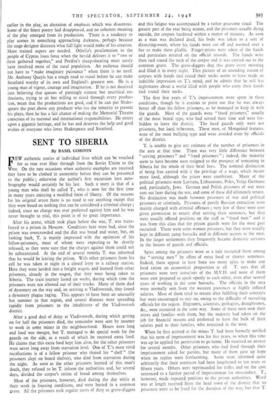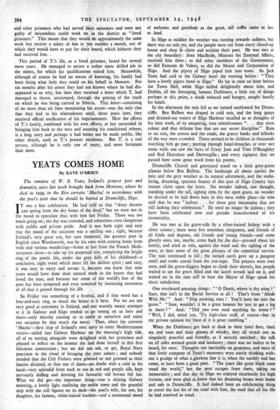SENT TO SIBERIA
By BASIL GORDON
FEW authentic stories of individual lives which can be vouched for as true ever filter through from the Soviet Union to the West. On the rare occasions when authentic examples are received they have to be clothed in anonymity before they can be presented to the public ; otherwise the author's first excursion into auto- biography would certainly be his last. Such a story is that of a young man who shall be called T., who is now for the first time in many years enjoying a modified form of liberty. Of the reasons for his original arrest there is no need to say anything except that they were based on nothing that can be considered a criminal charge ; indeed, since no charge was ever preferred against him and he was never brought to trial, this point is of no great importance.
After his arrest, which took place before the war, T. was trans- ferred to a prison in Moscow. Conditions here were bad, since the prison was overcrowded and the diet was bread and water, but, on looking back, T. is mainly impressed with the optimism of his fellow-prisoners, most of whom were expecting to be shortly released, as they were sure that the charges against them could not be substantiated. At the end of several months T. was informed that he would be leaving the prison. With other prisoners from his cell he was taken at night in a closed lorry to a railway station. Here they were herded into a freight wagon, and learned from other prisoners, already in the wagon, that they were being taken to Siberia. The train journey lasted six weeks, during which time the prisoners were not allowed out of their trucks. Many of them died of dysentery on the way and, on arriving at Vladivostock, they found a dysentery plague raging. This appears te have been an unusually hot summer in that region, and several diseases were spreading rapidly from prisoners to the inhabitants of the Vladivostock district.
After a good deal of delay at Vladivostock, during which getting on for half the prisoners died, the remainder were sent by steamer • to work in some mines in the neighbourhood. Hours were long and food was meagre, but T. managed to do special work for the guards on the side, as a result of which he received extra food. He claims that this extra food kept him alive, for the other prisoners were never long away from starvation level. One of T.'s most vivid recollections is of a fellow prisoner who shared his " shelf " (the prisoners slept on board shelves), who died from starvation during the night. As soon as the other prisoners learned of this man's death, they refused to let T. inform the authorities and, for several days, divided the corpse's ration of bread among themselves.
Most of the prisoners, however, died during the day while at their work in freezing conditions, and were buried in a common grave. All the prisoners took regular turns of duty as grave-diggers
and this fatigue was accompanied by a rather gruesome ritual. The greater part of the year being winter, and the prisoners usually dying outside, the corpses hardened within a matter of minutes. As soon as a man was declared dead, his body was taken to a sort of dissecting-room, where his hands were cut off and warmed over a fire to make them pliable. Finger-prints were taken of the hands and particulars entered on the official records. The hands were then tied round the neck of the corpse and it was carried out to the common grave. The grave-diggers dug this grave every morning and filled it in every night. This picture of an unending stream of corpses with hands tied round their necks seems to have made an indelible impression on T.'s mind, and he admits that he still has nightmares about a world filled with people who carry their hands tied round their necks.
The first five years of T.'s imprisonment were spent in these conditions, though he is anxious to point out that he was always better off than his fellow prisoners, as he managed to keep in with the guards. Most of the guards were "freed prisoners," usually of the most brutal type, who had served their time and were for- bidden to leave the district_ The head guards only were not prisoners, but local tribesmen. These men, of Mongoloid features, were of the most bullying type and were avoided even by officials of the district.
T. is unable to give any estimate of the number of prisoners in the area at that time. There was very little difference between "serving prisoners" and "freed prisoners " ; indeed, the majority seem to have become soon resigned to the prospect of remaining in Siberia for the whole of their brief lives. The nominal distinction of being free carried with it the privilege of a wage, which meant more food, although the prices were exorbitant. Many of the political prisoners were Latvians, Lithuanians, Poles, Volga Germans and, particularly, Jews. German and Polish prisoners of war were sent out later during the war, and some of these did ultimately return. No distinction was made between prisoners of war and political prisoners or criminals. Prisoners of purely Russian extraction were mainly charged with criminal offences ; very few of these were ever given permission to return after serving their sentences, but they were usually offered positions on the staff as "freed men" and it was from this class that the prison guards were for the most .Rart recruited. There were some women prisoners, but they were usually kept in different camp barracks and in different sectors to the men. In the larger settlements they frequently became domestic servants in the houses of guards and officials.
Spies among the prisoners were as a rule recruited from among the "serving men" by offers of extra food or shorter sentences. Indeed, there appear to have been too many spies to make any food ration an economical proposition at all. T. says that all prisoners were very conscious of the M.V.D. and none of them were ever prepared to speak openly to each other, even after several years of working in the same barracks. The officials in the area were normally sent from the western provinces at highly inflated salaries. Most of them tried to return after fulfilling their contracts but were encouraged to stay on, owing to the difficulty of recruiting officials for the region. Engineers, scientists, geologists, draughtsmen, &c., were recruited in the same way. Some of these men took their wives and families with them, but the majority had taken on the job for financial reasons and preferred to have the bulk of their salaries paid to their families, who remained in the west.
When he first arrived at the mines T. had been formally notified that his term of imprisonment was for five years, so when this time was up he applied for permission to go home. He received no answer for several months. Other prisoners who had lived through their imprisonment asked for paroles, but many of them gave up hope when no replies were forthcoming. Some were informed quite arbitrarily that their sentences had been lengthened to ten years or fifteen years. Others were reprimanded for trifles and on the spot sentenced to a further period of imprisonment for misconduct. T., however, made repeated petitions to the prison authorities. Word was at length received from the head town of the district that no prisoners were to be freed for the duration of the war, but that T. and other prisoners who had served their sentences and were not guilty of misconduct could work on in the district as "freed prisoners." This meant that they would do approximately the same work but receive a salary of 600 to 700 roubles a month, out of which they would have to pay for their board, which hitherto they had received free. -
This period of T.'s life, as a freed prisoner, lasted for several more years. He managed to secure a rather more skilled job in the mines, for which his qualifications suited him. Meanwhile, although of course he had no means of knowing, his family had been doing what little they could on his behalf in Moscow. For six months after his arrest they had not known where he had dis- appeared to or why, but then they received a letter which T. had managed to throw, unstamped, through the grating of the trpck on which he was being carried to Siberia. This letter—consisting of no more than six lines mentioning his arrest—was the only clue that they had to his whereabouts until, three years later, they received official notification of his imprisonment. How the- efforts of T.'s family, combined with his own efforts, at last succeeded in bringing him back to the west and securing his conditional release, is a long story and perhaps it had better not be made public, like other details, such as T.'s present residence. But T. is a real person, although he is only one of many, and more fortunate than most.



































 Previous page
Previous page